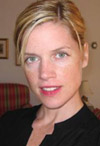- Categories:
Playing by a Different Set of Rules: Independent Booksellers as Mavericks
 William C. Taylor  Polly LaBarre |
William C. Taylor and Polly LaBarre, the authors of Mavericks at Work (coming from William Morrow this fall), encouraged bookstore owners and managers at ABA's BookExpo America education session "Independent Booksellers as Mavericks" to look beyond best practices to "next practices." Taylor, the founding editor of Fast Company, and LaBarre, formerly a senior editor for Fast Company, discussed how small businesses can make their mark by out-thinking large business competitors and by not playing it safe. "Most big organizations exist to play it safe, and that is not playing it smart," Taylor said.
Noting that his favorite book is Howard Frank Mosher's Waiting for Teddy Williams (Mariner), Taylor compared independent retailers to the Boston Red Sox -- the David to the New York Yankees' Goliath. Like the Sox, he said, independents can defy the odds and beat the corporate retail giants. "This is a great time to be an innovator or an entrepreneur," he said. "You can outthink them -- the strong take from the weak, but the smart take from the strong."
The airline industry is a net money loser, Taylor said, "but amid all of this one company is making money -- Southwest Airlines." And he attributed the airline's success to its being the industry's one Maverick player.
"They rethought what it is to be Southwest Airlines," Taylor continued. "They said, 'We're not in the airline or in the transportation business -- we're in the freedom business.'" Southwest challenged conventional wisdom. "No first-class seats, no assigned seats -- they're playing by different rules. Ask yourself: Is there really a distinctive and disruptive idea at the heart of my company?" He added: "What do you see about your business that the big boys don't?"
As an example of a small company that's had a big influence on its marketplace, LaBarre pointed to the website Craig's List, a no frills online, national classifieds page. "Craig's List ... is a worldwide sensation," she said. The website is "low key" and is built on "a very simple model." It provides a place for a community of users to swap books, look for apartments, etc., she said. "It's bare bones, it's anti-commercial. It's a viable business that isn't aspiring to be a Google.... It's the ultimate David & Goliath story."
LaBarre said that Craig's List, which supports its operations by charging businesses "below-market rates" for help wanted ads in San Francisco, New York City, and Los Angeles, does not worry about branding. "They try to figure out ways not to charge customers, and they have no interest in competing." But she added, "They are a deadly competitor of the newspaper business."
Said Taylor, "One of the tough questions and the most powerful is to ask yourself, if you went out of business tomorrow, who would miss you and why?" Obviously, if no one would miss you, there's "something wrong with how your company is thinking of its customers.... You need to create a psychological contact with your customers. You need to be a memorable company to do business with."
"You don't have to make [your store] theatrical to make it memorable," LaBarre said, noting that customers are eager to connect with an organization that stands out from the crowd.
The authors also urged booksellers in the room to grapple with a tough question: "When I walk into a bookstore, it all feels the same to me. What's next?" He noted that Commerce Bank has changed the notion of traditional banking by staying open late and being open on Sundays. The bank has added fun to retail banking by offering a "penny arcade" where customers can deposit coins in exchange for bills. "What is your industry's next penny arcade?" Taylor said. --David Grogan
To read an earlier BTW interview with Taylor and LeBarre about their maverick business strategies and philosophies and how they can benefit booksellers, click here.

